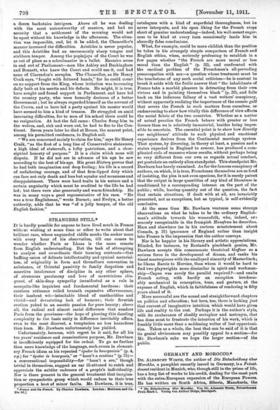STRANGERS STILL.*
IT is hardly possible for anyone to have lived much in France without wishing at some time or other to write about that brilliant race, whose unguarded riddle mocks the seeker more with every hour of his observation, till one comes to wonder whether Paris or Lhasa is the more remote from English understanding. But the task of attempting to analyse and co-ordinate their teeming contrasts—that baffling union of delicate intellectuality and cynical material- ism, of originality in form and threadbare convention in substance, of Oriental passivity to family despotism and assertive intolerance of discipline in any other sphere, of strenuous parsimony and love of meretricious c/in- pant, of skin-deep sympathy (manifested as a rule in mosquito-like inquiries) and fundamental hardness: their cautious reticence veiled beneath expansive effervescence, their lambent wit—inimitable blend of cantharidine and vitriol—and devastating lack of humour ; their feverish erotism yoked to an ascetic passion for pure beauty; above all, the radical and almost racial difference that sunders Paris from the provinces—the hope of piercing this dazzling complexity to the basic unity in difference inevitably offers, even to the most discreet, a temptation no less hazardous than keen. Mr. Dawbarn unfortunately has yielded.
Unfortunately, because, with regret be it said, for all his ten years' residence and conscientious purpose, Mr. Dawbarn is insufficiently equipped for the ordeal. To go no further than mere knowledge of the language, such errors in element- ary French idiom as his repeated " epater la bourgeoisie" (p. 4, e.g.) for "ipater is bourgeois," or " hasn't a centime" (p. 75)- a conversational impossibility—for " hasn't a sou," though trivial in themselves, suggest an ear ill-attuned to catch and appreciate the subtler cadences of a people's individuality. Nor is there present in the general treatment that imagina- tion or sympathetic grasp which would reduce to their true proportion a host of minor faults. Mr. Dawbarn, it is true, • Preaca sad the French. By Charles Dawbarn. London : Methuen and Co. 10s. 6d.]
catalogues with a kind of superficial thoroughness, but be never interprets, and his open liking for the French stops short of genuine understanding—indeed, his well-meant eager-. ness to be kind at every turn occasionally lands him in absurdly false conclusions.
What, for example, could be more childish than the position he takes in his strangely simple comparison of French and English ethics, when, seriously professing to establish in a few pages whether "the French are more moral or less moral than the English " (p. 32), and confronted with the cardinal problem of the Frenchman's all-pervading preoccupation with sex—a question whose treatment must be the touchstone of any such social criticism—he is content to brush it aside with the futile answer that " the inhabitants of France take a morbid pleasure in detracting from their own virtues and in painting themselves black " (p. 33), and falls back on the ludicrous fallacy of a vast writers' conspiracy, without apparently realizing the importance of the cosmic gulf that severs the French in such matters from ourselves, or endeavouring to show how vitally this difference of view affects the social fabric of the two countries. Whether as a matter of actual practice the French behave with greater or less licence than we is relatively immaterial, besides being impos- sible to ascertain. The essential point is to show how directly our neighbours' attitude to such physical and emotional experience derives from the Continental marriage system That system, by divorcing, in theory at least, a passion and a status expected in England to concur, has produced a com- plicated code of manners whose results, without perhaps being so very different from our own as regards actual conduct, yet postulate an entirely alien standpoint. This standpoint Mr. Dawbarn has barely examined. As for the famous conspiracy of authors, on which, it is true, Frenchmen themselves are so fond of insisting, the plea is not even specious, for it is surely patent that the output in large quantities of any kind of literature is conditioned by a corresponding interest on the part of the public ; while, leaving quantity out of the question, the fact that certain situations, if dealt with at all, are invariably presented, not as exceptions, but as typical, is self-evidently conclusive.
At the same time Mr. Dawbarn ventures some strange observations on what he takes to be the ordinary English- man's attitude towards his womenfolk, who, indeed, ar3 scarcely recognizable in the frumpish Hausfrau he describes. Here and elsewhere (as in his curious misstatement about Consols, p. 31) ignorance of England rather than insight into France is the impression that the author conveys.
Nor is he happier in his literary and artistic appreciations. Blinded, for instance, by Rostand's pinchbeck genius, Mr. Dawbarn accepts this consummate theatrical bluffeur as a serious force in the development of drama, and ranks his tinsel masterpieces with the unalloyed sincerity of Maeterlinck; he likens Barrie to Hervieu, than whom it would be bard to find two playwrights more dissimilar in spirit and workman- ship—Capus was surely the parallel required ?—and exalts French acting, with hardly an exception irredeem- ably mechanical in conception, tone, and gesture, at the expense of English, which in faithfulness of rendering is fifty years ahead of it.
More successful are the sound and straightforward chapters on politics and education; but here, too, there is lacking just that current of imaginative intuition which would have given life and reality to the rest. Perhaps it is the author's style, with its exuberance of shoddy metaphor and metonym, that has done most to frustrate the intention of his work, which is frankly little more than a saddening welter of lost opportuni- ties. Taken as a whole, the best that can be said of it is that its genial obviousness may possibly appeal to a section—for Mr. Dawbarn's sake we hope the larger section—of the public.


















































 Previous page
Previous page